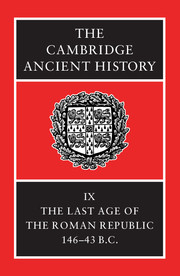13 - The Constitution and Public Criminal Law
Published online by Cambridge University Press: 28 March 2008
Summary
I. THE ROMAN CONSTITUTION
In what sense can one talk of ‘the Roman constitution’? Clearly, Rome had no written constitution of the type introduced into the modern world by the United States in 1787, but did Rome have a constitution in the weaker sense one uses in speaking of the British constitution? The answer must be both ‘yes’ and ‘no’. Bolingbroke in 1734 (A Dissertation upon Parties, Letter 10 ad init.) offers a working definition: ‘By Constitution, We mean, whenever We speak with Propriety and Exactness, that Assemblage of Laws, Institutions and Customs, derived from certain fixed Principles of Reason directed to certain fixed Objects of Publick Good that compose the General System, according to which the Community hath agreed to be governed.’ Now it is striking how Cicero in dealing with issues which we would label ‘constitutional’ appeals to an ‘Assemblage’, to use Bolingbroke’s word, with which the latter, and his readers, would have felt immediately at home. For example, when in March 43 the orator wishes to argue that M. Lepidus, the future triumvir currently governing Gallia Narbonensis and Hispania Citerior, cannot do what he likes with his army, he says: ‘It is lawful for no man to lead an army against his country, if by lawful we mean (si licere id dicimus) that which is allowed by the laws (legibus) and by the custom and institutions of our ancestors (more maiorum institutisque.)’ Sometimes Cicero adds the notion of ius, roughly equivalent to ‘right’ or ‘justice’; for instance, he summarizes as follows an attack by L. Aurelius Cotta on the manner in which Clodius had engineered Cicero’s exile:
L. Cotta said … that nothing in my regard had been carried out rightfully (jure), in accordance with the custom of our ancestors or in accordance with the laws: no one can be removed from the body politic without a trial or be the object of a motion or even a judgement involving the loss of civil personality except before the centuriate assembly – Clodius’ proceedings had been a case of brute force …’
Another element introduced into what we would regard as constitutional discussions is precedent (exemplum): Cicero condemns Gabinius, governor of Syria, for occupying Alexandria although mos maiorum, exempla and the severest penalties of the law forbade it.
Thus far Cicero seems to be discussing constitutional issues in a thoroughly British manner.
- Type
- Chapter
- Information
- The Cambridge Ancient History , pp. 491 - 530Publisher: Cambridge University PressPrint publication year: 1994



